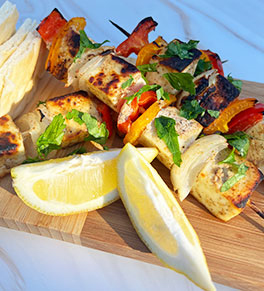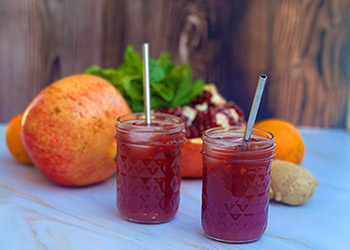Quick and tasty global cuisine

Can’t get away for some international travel this summer? Bring the world to you with these Indian and Syrian-influenced dishes.
A colorful mocktail and two exotic sheet pan dinners let you sample exotic cuisines while keeping your time in the kitchen to a minimum.
“Summer is the perfect time to partake in all the season’s fresh vegetables and fruits as well as experiment with unique spices to add flavor,” says Katie Rankell, a registered dietitian and program director of the UCI Health Weight Management Program.
Culinary adventures await with these delicious recipes crafted by Jessica VanRoo, executive chef of the Susan Samueli Integrative Health Institute, part of UCI Health.
Sunshine pomegranate mocktail

This refreshing pomegranate and citrus-flavored beverage sparkles like a ruby in the sunlight and is full of heart-healthy ingredients without the alcohol.
Native to Iran and northern India, pomegranates over the centuries have been introduced to other warm weather climates around the world, including California, the top U.S. producer of this juicy fruit.
“Many mocktails can be too sweet or too simple," says Rankell. "But this one has layers of flavor as well as healthy nutrients and vitamins to give you an energy boost during these hot summer days.”
Did you know that pomegranates can have up to three times more antioxidants than green tea or red wine?
The rich, red color of their seeds (arils) is the clue that it contains the most powerful antioxidant in the carotenoid family — lycopene, which helps protect your cells from damaging chemicals and reduces inflammation.
Pomegranates are also rich in plant pigments called anthocyanins and anthoxanthins that account for their deep red and purple hues. These pigments support heart health by helping to reduce artery-clogging LDL (bad) cholesterol and increase HDL (good) cholesterol, which lowers your risk of strokes and heart attacks.
Jump to recipe ›
Freshly squeezed orange and lemon juices infuse this drink with a hefty dose of vitamin C, which strengthens the immune system and helps keep skin smooth and elastic. In fact, one medium orange has all the vitamin C you need in a day. Citrus fruits also are loaded with B vitamins, potassium, magnesium, phosphorus and copper.
The grated ginger root in this recipe is well-known for its stomach-soothing properties. It, too, is rich in antioxidants and anti-inflammatory compounds that improve blood flow and help cleanse toxins from the body.
As for mixers, club soda, ginger beer and ginger kombucha are all healthy choices. But as a fermented liquid, kombucha can kick up the benefits to your gut microbiome an extra notch.
Chaat masala-spiced paneer and vegetable skewers
 Chaat masala is an Indian spice blend that tastes mildly fiery with an acidic zing.
Chaat masala is an Indian spice blend that tastes mildly fiery with an acidic zing.
It is made primarily with cumin, mango powder and asafoetida — a potent gum resin taken from the root of ferula plants. These ingredients are a rich source of minerals, including iron and calcium. Iron is essential for producing healthy red blood cells and calcium is a building block for strong bones.
Paneer is a type of fresh cheese commonly used in South Asian cuisine. It is made by curdling milk with a natural acid, usually lemon juice, vinegar or citric acid. The taste is similar to cottage cheese or ricotta, but because paneer is usually made without rennet, it has a firmer texture and does not melt easily, making it perfect for these vegetarian skewers.
Paneer is also a great source protein, calcium and the fat-soluble vitamins A and D.
Jump to recipe ›
Bell peppers add a pop of color to this dish, plus they are full of vitamins C, A and K1, folate, as well as potassium and many other antioxidants that support immune system and eye health. They also contain vitamin E — essential for healthy nerves and muscles — and are full of fiber for gut health!
Marinated in Greek yogurt and other fresh herbs and citrus notes, these juicy kebabs will wow the family and get you out of the kitchen in record time.
Aleppo pepper mahi-mahi with mint
 This recipe is rooted in Turkish flavors. The country of Turkey is bordered by the Black Sea to the north and the Mediterranean Sea to the south. With that much coastline, fish is definitely part of the local fare. And because it was at the center of ancient trade routes, a confluence of cultures and foods is evident in Turkish cuisine, too.
This recipe is rooted in Turkish flavors. The country of Turkey is bordered by the Black Sea to the north and the Mediterranean Sea to the south. With that much coastline, fish is definitely part of the local fare. And because it was at the center of ancient trade routes, a confluence of cultures and foods is evident in Turkish cuisine, too.
Aleppo pepper, named for the city in neighboring Syria where these chiles once grew abundantly, is made from deep red Halaby chiles. They’re described as being mildly spicy with notes of raisin and sun-dried tomatoes, undertones of cumin and lemony top notes.
Most chiles are replete with antioxidants, chief among them capsaicin — which provides the heat sensation. A powerful anti-inflammatory agent, capsaicin may help with weight loss when taken as a supplement. It also is an ingredient in some topical pain-relief creams.
Jump to recipe ›
The mint leaves give this recipe an extra boost of antioxidants and phytonutrients, along with vitamin A, vitamin C and B-complex, phosphorous and calcium. Best of all, this pairing of pepper and mint gives a fresh yet spicy finish to the marinade, while pumping up the nutrient profile.
Mahi-mahi is a perfect choice to showcase these spices. This firm white fish takes on almost any sauce or flavoring effortlessly. It’s also an excellent source of lean protein — 20 grams per three-ounce serving, plus 146 mg of omega-3 fatty acids, which play an essential role in brain and heart health by decreasing inflammation in the body.
Mahi-mahi also is rich in niacin, B12, phosphorus and selenium, but low in mercury content.
“This recipe is so versatile!” says VanRoo. “You can also grill the fish if it’s too hot to use your oven.”
Related stories
- Getting the most from your summer harvest ›
- Delicious garden-to-table meals ›
- Tropical island-inspired recipes ›
- Mediterranean diet meals ›
Explore Further
Browse more blog posts by topic.




